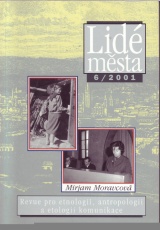Člověk v antické polis
DOI:
https://doi.org/10.14712/12128112.4160Abstrakt
In order to understand what happens in the movement of emancipation and to which extent the movement establishes and develops the understanding of alternative, or, better speaking, openness to alternative, which means when we are able to understand "them" as an alternative to our "us," we have to examine the almost obliterated traces of the emergence of emancipation in the ancient world, which has always been accompanied with questioning the identity of a community. First, such a process of examination breaks our vague, idealised and therefore inaccurate ideas about a golden age of the ancient world. Second, it may lead us out of the blind wandering in these traces. In such an interpretation Europe becomes a triple attempt at coming to terms with the disintegration of the tribal constitution of a society and the disarray which accompanied the disintegration in the first half of the first millennium. The three attempts are united by the motive of a constitution, the idea of an agreement, which is not a matter of just a tradition, although it may be divine, but of an act of decision and a complex effort at maintaining and reformulating the agreed conditions. The first variant means a concept of an agreement between JHVH and ancient Hebrews, the second variant is the Greek discovery of dualism between the private and public spheres, from which emanates a democratic constitution of a society, the third is the Roman idea of empire as a sacred family, conceived hierarchically in the clients_links which spans in time ad infinitum. Although we speak about surmounting a tradition, which implies rejection of past links to the benefit of the present, the academic discourse, though it is obsessed with an effort to be up-to-date, cannot be identified with a discourse which is open to alternatives because one can distinguish in the proposed universality a modern mono-myth which actually follows up the Greek programme of a plausible language in the sense of LOGOS, in which solely the Greek is the language. Understanding other people as "some of us" is a task of non-theoretical fields and of novels in particular. Europe born from the experience of alternative search is being made universal and it understands in a cultural fashion hospitality which is always hospitality in relation to a different form of experience. This constitutional nature of Europe allows it to experience future as an incomplete, but open and hopeful entity.
Stahování
Publikováno
Jak citovat
Číslo
Sekce
Licence

Tato práce je licencována pod Mezinárodní licencí Creative Commons Attribution-NonCommercial-NoDerivatives 4.0.


